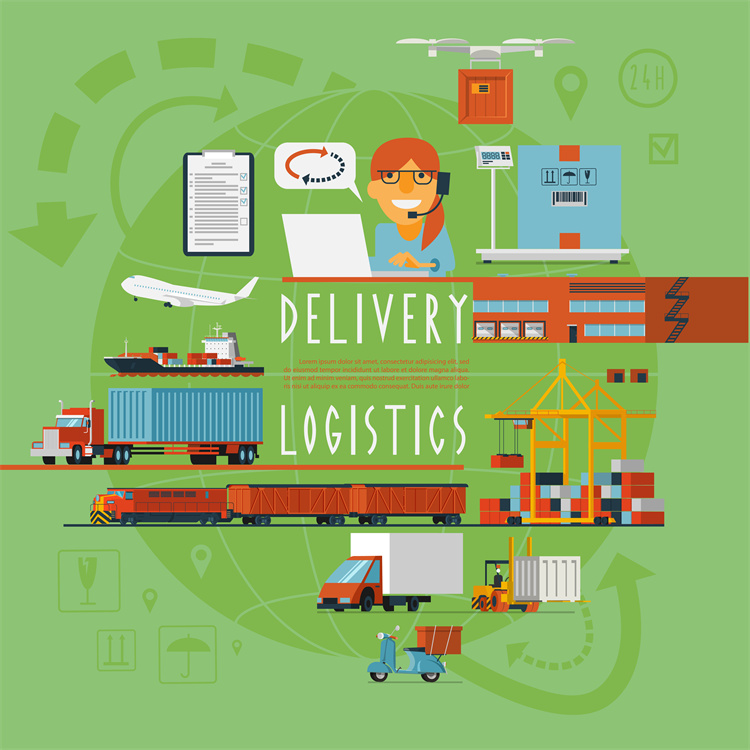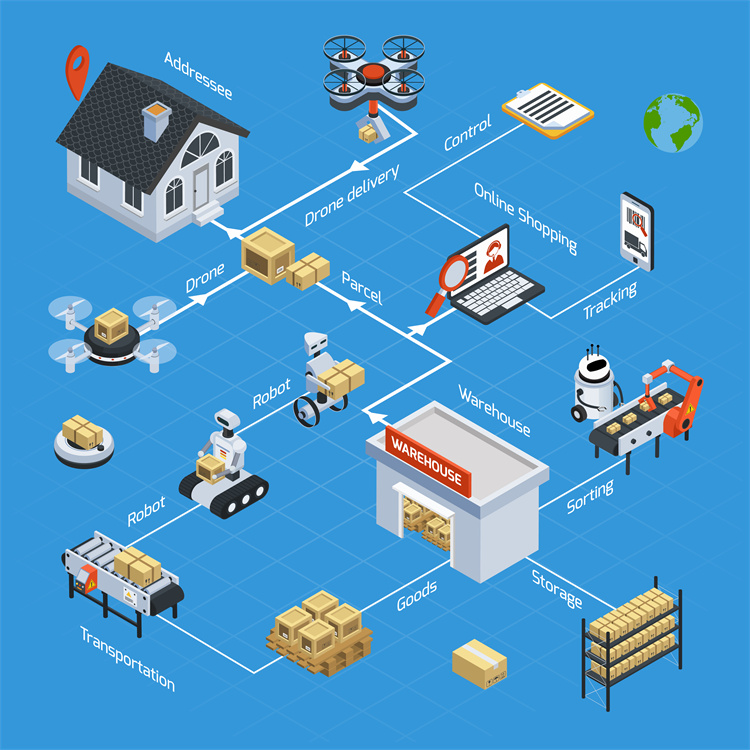Integrated Logistics Services in America: What to Know in 2024 Q4

Integrated logistics services in the American market streamline supply chain operations by integrating transportation, warehousing, and inventory management. These services are crucial for enhancing efficiency and reducing costs across the United States. By the fourth quarter of 2024, the logistics landscape in America is expected to experience significant growth. With over 20,410 Third-Party Logistics (3PL) companies operating nationwide, the logistics IT market has expanded, with 86% of vendors acquiring more customers. The retail and manufacturing sectors are the primary drivers of this demand. This trend highlights the essential role of integrated logistics in bolstering economic activities.
Understanding Integrated Logistics Services

Definition and Scope
Integrated logistics services encompass a comprehensive approach to managing the supply chain. These services combine transportation, warehousing, and inventory management into a seamless operation. Businesses benefit from integrated logistics services by achieving streamlined processes and cost efficiencies. The American market has seen a rise in demand for these services due to their ability to enhance operational effectiveness.
Key Components
The key components of integrated logistics include transportation management, warehousing solutions, and inventory control. Transportation management ensures the efficient movement of goods across various modes. Warehousing solutions provide storage and distribution capabilities. Inventory control maintains optimal stock levels to meet customer demands. Each component plays a crucial role in creating a cohesive supply chain network.
Benefits for Businesses
Businesses experience several benefits from utilizing integrated logistics services. Cost reduction stands out as a primary advantage. Companies can lower expenses by optimizing transportation routes and reducing storage costs. Enhanced efficiency results in faster delivery times and improved customer satisfaction. Integrated logistics also offer scalability, allowing businesses to adapt to changing market conditions.
Market Trends in 2024
The logistics industry in America is poised for significant advancements in 2024. Technological innovations and regulatory changes will shape the landscape of integrated logistics services.
Technological Advancements
Technological advancements will revolutionize integrated logistics services. Autonomous delivery solutions, such as self-driving trucks, are expected to enter real-world use. Major companies are exploring partnerships to enhance last-mile delivery. Digital twins have emerged as a powerful tool for reducing supply chain interruptions. According to Gartner Research, companies using digital twins observed a 30% decrease in disruptions in 2023. These technologies promise to increase efficiency and reliability in logistics operations.
Regulatory Changes
Regulatory changes will impact the logistics sector in 2024. New regulations aim to improve environmental sustainability and safety standards. Green logistics practices will become more prevalent as companies strive to comply with these regulations. Businesses must stay informed about evolving policies to remain competitive. Compliance will require investment in sustainable technologies and practices.
Characteristics of Effective Integrated Logistics Services
Efficiency and Reliability
Efficiency and reliability define successful integrated logistics services. Timeliness ensures goods reach destinations without delay. Businesses rely on precise scheduling to meet customer expectations. Punctual deliveries enhance reputation and foster trust.
Accuracy in logistics operations minimizes errors. Accurate data management supports inventory control and order fulfillment. Companies achieve seamless operations by maintaining high accuracy levels. This precision reduces costs and improves customer satisfaction.
Flexibility and Scalability
Flexibility allows businesses to adapt to changing demands. Integrated logistics services in the American market offer solutions for demand fluctuations. Companies adjust resources to meet varying customer needs. This adaptability ensures consistent service quality.
Scalability provides growth opportunities for businesses. Customization options enable tailored logistics solutions. Companies select specific services that align with business goals. This approach optimizes performance and maximizes efficiency.
Challenges in the American Logistics Sector

Supply Chain Disruptions
Causes and Impacts
Supply chain disruptions present significant challenges in the logistics sector. High operating costs, including fuel, labor, and insurance, contribute to these disruptions. The logistics industry also faces a capacity glut, which results in inefficiencies. Elevated costs of regulations further strain resources. These factors lead to delays and increased expenses for businesses.
Disruptions impact various aspects of logistics operations. Businesses experience delays in transportation and warehousing services. Rate inflation affects the cost-effectiveness of logistics solutions. Ocean and rail transportation face challenges due to these disruptions. Companies must navigate these obstacles to maintain operational efficiency.
Mitigation Strategies
Effective strategies can mitigate supply chain disruptions. Companies should focus on enhancing supply chain resilience. Risk management practices help identify potential disruptions early. Businesses can implement digitalization to streamline operations. Technology aids in monitoring and managing logistics processes efficiently.
Logistics providers should invest in sustainable practices. Green logistics reduces dependency on volatile resources. Companies can optimize routes to minimize fuel consumption. Collaboration with partners ensures better resource utilization. These strategies enhance the overall reliability of logistics services.
Environmental and Sustainability Concerns
Green Logistics Practices
Environmental concerns drive the adoption of green logistics practices. The logistics industry focuses on sustainability to reduce environmental impact. Companies implement eco-friendly transportation solutions. Electric vehicles and alternative fuels play a crucial role. Warehousing facilities adopt energy-efficient technologies.
Green logistics practices offer several benefits. Businesses achieve cost savings through reduced energy consumption. Sustainable practices enhance brand reputation. Customers appreciate environmentally responsible companies. Logistics providers gain a competitive edge by prioritizing sustainability.
Compliance with Regulations
Compliance with environmental regulations is essential for logistics providers. New regulations aim to improve sustainability standards. Companies must adhere to these policies to avoid penalties. Investment in sustainable technologies ensures compliance. Businesses should stay informed about evolving regulations.
Regulatory compliance offers long-term advantages. Companies build trust with stakeholders through adherence. Compliance enhances operational efficiency and reduces risks. Logistics providers can leverage compliance as a marketing advantage. A commitment to sustainability aligns with consumer expectations.
Evaluation Criteria for Selecting an Integrated Logistics Partner
Selecting the right integrated logistics partner requires careful evaluation of several key factors. Businesses must ensure that their logistics provider aligns with their operational needs and strategic goals. This section outlines the essential criteria for evaluating potential logistics partners.
Service Offerings and Capabilities
Range of Services
A comprehensive range of services defines a robust logistics partner. Companies should look for providers offering diverse solutions, including transportation management, warehousing, and inventory control. A wide service portfolio ensures that businesses can address all logistics needs under one roof. This integration enhances efficiency and reduces complexity in supply chain operations.
Technological Integration
Technological integration plays a critical role in modern logistics. Providers must leverage advanced technologies to optimize logistics processes. Real-time tracking systems, automated inventory management, and data analytics tools are essential features. These technologies enable precise decision-making and improve overall supply chain performance. Businesses benefit from increased visibility and control over logistics operations.
Reputation and Experience
Industry Expertise
Industry expertise is a vital consideration when selecting a logistics partner. Experienced providers possess deep knowledge of market dynamics and regulatory requirements. This expertise allows them to navigate challenges effectively and provide tailored solutions. Companies should prioritize partners with a proven track record in the logistics industry. industry expertise
Spotlight on JUSDA
Overview of JUSDA's Integrated Logistics Services
JUSDA Supply Chain Management International Co., Ltd. stands as a leader in integrated logistics within the American market. The company offers unique services that span from raw material procurement to end consumer delivery. JUSDA excels in lean supply chain management by utilizing advanced technologies like big data, IoT, and cloud platforms.
Unique Offerings
JUSDA's offerings include multimodal transportation, warehousing, e-commerce distribution, cross-border logistics, and supply chain finance. The JusLink platform provides real-time collaborative systems that integrate suppliers, manufacturers, service providers, and customers. This integration ensures efficient resource utilization and precise business decision-making.
Market Position
JUSDA holds a strong market position with a global presence. The company operates 155 service points worldwide and manages over 2.5 million square meters of warehousing. More than 2,000 international service routes support JUSDA's operations. Recognition as a unicorn enterprise underscores JUSDA's influence and innovation in the logistics industry.
Achievements in 2024
JUSDA achieved significant milestones in 2024 by leveraging AI-driven decision-making, real-time tracking, and predictive analytics. These technologies have led to improved communication and cost savings. The company's commitment to operational excellence has resulted in high levels of customer satisfaction and loyalty.

JUSDA Solutions
To provide you with professional solutions and quotations.
Integrated logistics services in the American market have become essential for businesses seeking efficiency and cost reduction. Choosing the right logistics partner involves understanding operations, culture, and business objectives. A strong partnership goes beyond cost savings. The future of integrated logistics in America looks promising with advancements in AI and machine learning. These technologies enhance decision-making and improve operational efficiency. Companies should adopt green logistics solutions to reduce environmental impacts and improve reputations. As the industry evolves, businesses must stay informed and adaptable to maintain a competitive edge.
See Also
Revealing Sea Cargo Operations: Latest Trends in 2024
Best 5 Logistics Courses for 2024
Artificial Intelligence in Supply Chain: Transforming Future Logistics
JUSDA's Technology in Logistics: Unlocking Improved Productivity
Understanding Advanced Manufacturing: Revealing JUSDA's Logistics Innovations
